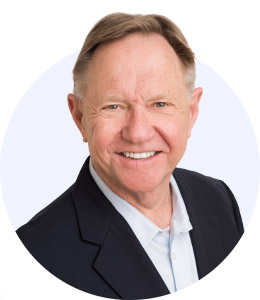Imagine that you go to your primary care physician. After an exam and some testing, the physician refers you to another physician who has more experience in your situation. Often this person is called a specialist. While a referral can cause anxiety, your physician made the right call. During their medical school, physicians rotate and have experience in all medical areas. They specialize during residency in an area of their choice. They know that other physicians have more depth of experience than they do in certain situations. In those instances, they bring in a specialist based on specific patient needs.
Or, let’s say you work with a knowledgeable landscaping company. When working in your yard they notice that a tree’s condition is concerning. Due to the tree situation they recommend specialists with deeper expertise in trees.
I have experienced both ends of the spectrum on asking for and receiving advice. Receiving help from people with more expertise than I have has been huge for me. In my first role as the director of marketing at Mercy Hospital in Janesville, Wisconsin, I was tasked with implementing an advertising campaign. As I interviewed marketing companies, I became very aware that I knew much less than I thought. Al Topin and his company taught me a lot. Al recommended Gallup for market research. This was another win.
I am a big believer in research. When I got to Holy Cross Hospital in Chicago, CEO Mark Clement had brought in Ken Kaufman of Kaufman Hall to help look at how to improve financially. Mark taught me a valuable lesson: Ask the consulting firm who their best client ever has been and why. He also taught me to ask, “What do we need to do so we can make sure we optimize your service?” One also hears what common reasons are when a consulting arrangement does not work.
When I arrived at Baptist Health Care, I experienced the use of an industrial psychologist, Dr. Chris Reilly, as part of the hiring process. This was to ensure that the fit was right for the system and the person. Even though I am no longer with Baptist Health Care in Pensacola, I still use the services of Dr. Reilly.
Sadly, at times, bringing in expertise is not understood.
In Pensacola, we have a Center for Civic Engagement. They bring in quality of life experts. The experts share their experiences and suggestions. It is called CivicCon, which stands for Civic Conversations. The goal is to raise the community’s civic IQ. Tom Murphy, a past mayor of Pittsburgh, presented on public/private arrangements. He said that too often the private party, often a developer, out-negotiates the public entity. The reason is that the private company has more expertise in such negotiations. He encouraged the citizens not to criticize public officials when they bring in extra resources at times to augment their team.
A few years ago, a community was looking at investing public dollars in a project and called me for advice. I suggested they call James Lima. He is a specialist in assessing the use of taxpayer dollars. He helps answer questions like, “Will the project attract sufficient private investment to offset the public monies?” and, “For that to happen, what is the best location for such a project?” The city brought James in when the project was far along. His work was mostly focused on location: not the land itself but where to best place the project on the land. He suggested moving the facility closer to the road and placing parking behind it, and showed how that would help attract additional private investment. The next week the local paper wrote an editorial on how spending the money to bring him in was not wise (it was a lot less expensive than you might imagine). The editorial stated that the city should have figured it out on their own. Being close to the situation, I disagree. The paper missed what this shift on the site would do.
A great disadvantage that small businesses, public entities, and early careerists have is the limited ability to tap such expertise. Another mentor of mine, Bert Thornton, uses the term, “Find an old gorilla.” (In fact, he wrote a book with that title.) What it means is to seek out people with more knowledge than you have. The best performers are the best seekers of knowledge and help.
Here are some tips:
- If you are fortunate to work for a person and/or organization that invests in bringing in expertise, be grateful and soak up all the knowledge you can. You are in a good situation. What is going well will be recognized and what can be done better will be provided. Don’t be defensive.
- Here it comes: Hold up the mirror. Usually when consulting services are brought in, there are valid reasons why. For instance:
- It’s an area in which the market is changing quickly, and the internal staff do not have the wealth of knowledge in the area that a consultant brings.
- The area (or areas) is not meeting goals, and an outside view will help.
- To move a timeline along. By increasing resources, the organization can catch up or gain time they could not have made up on their own.
- To stay ahead of others. In the early 2000s, Dr. Fred Loop called me. He was, at the time, CEO of the Cleveland Clinic. He said he wanted to bring me to the Cleveland Clinic Foundation (CCF) for help in improving patient experience. He wanted to enhance their world-class care. I was taken aback. They were good. I said, “Dr. Loop, you are already so good.” He said, “We want to be better.” The best always want to be better.
- Be careful of subconscious or even conscious steps people are taking to not maximize the help. You might hear questions or statements like: Why are they bringing in help; are we not good? We are different from others. How can we spend money when we are not in good financial shape? People might spend time trying to find faults in the consultant. Most often, outside expertise is brought in to assist early careerists (a great investment) or less experienced people (a great investment), or because results are not where they need to be (a great investment), or to move results at an accelerated pace (another great investment)!
There are many wonderful experts out there. Knowing when it’s time to seek their help is the mark of a wise leader. When the student is ready the teacher appears. Be a great student on ways to enhance your skill. It will pay off throughout your career.







